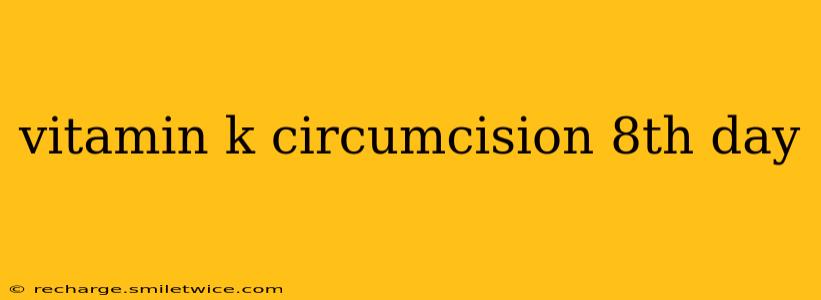Circumcision on the 8th day after birth is a common practice in some religious and cultural traditions. Many parents understandably have questions about the procedure, particularly concerning the administration of Vitamin K. This article aims to clarify the relationship between Vitamin K, circumcision, and the timing of the procedure on the 8th day.
What is Vitamin K and Why is it Important for Newborns?
Vitamin K is a crucial nutrient vital for blood clotting. Newborns have low levels of Vitamin K at birth, making them susceptible to Vitamin K Deficiency Bleeding (VKDB), a condition that can lead to serious bleeding complications. To prevent VKDB, newborns are routinely given a Vitamin K shot (usually intramuscularly) shortly after birth.
Is Vitamin K Administered Before, During, or After Circumcision?
The administration of the Vitamin K shot is typically independent of the circumcision procedure. It's a standard part of newborn care and is usually given within the first few hours of life, regardless of whether circumcision is planned. Therefore, the timing of circumcision (8th day or otherwise) doesn't affect the Vitamin K injection.
Does the 8th-Day Circumcision Affect Vitamin K Absorption or Efficacy?
No, the timing of the circumcision relative to the Vitamin K injection doesn't impact the vitamin's absorption or efficacy. The injection site is different from the circumcision site, and the small amount of blood loss from circumcision is not significant enough to interfere with the Vitamin K's function.
What are the Risks of Circumcision on Day 8?
While circumcision is generally a safe procedure, risks exist regardless of when it's performed. These risks include bleeding, infection, and pain. The 8th day is not inherently more risky than other days, but it's crucial that the procedure is performed by a qualified medical professional in a sterile environment. Parents should discuss these risks and potential complications with their healthcare provider.
Can Vitamin K Deficiency Affect Healing After Circumcision?
While Vitamin K deficiency is a serious concern for newborns, it's unlikely to significantly affect the healing process after a routine circumcision. The small wound from circumcision usually heals well within a week, even with the baby's normal Vitamin K levels. A Vitamin K deficiency would increase the risk of bleeding, but the preventive injection greatly minimizes this risk.
What are the Benefits of Circumcision?
Numerous studies explore the benefits and risks of circumcision. Some studies suggest reduced risk of urinary tract infections (UTIs) and sexually transmitted infections (STIs) in circumcised males. However, these benefits need to be weighed against potential risks and parental preferences. The decision to circumcise is a deeply personal one.
What are the Alternative Days for Circumcision?
While the 8th day holds cultural significance for some, circumcision can be performed at other times during the newborn period. Discussions about the optimal timing should happen between parents and their doctor, considering individual circumstances and any potential medical factors.
What if I have Concerns about Circumcision or Vitamin K?
If you have concerns about circumcision, Vitamin K administration, or any aspect of your newborn's care, it is crucial to discuss them openly and honestly with your pediatrician or healthcare provider. They can provide personalized advice based on your individual situation and address all your questions and anxieties. Don't hesitate to seek clarification until you feel fully informed and comfortable with the decisions being made for your child's well-being.
